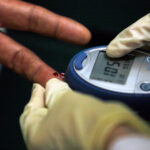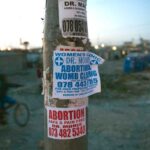Nurses and doctors are ‘forced’ to treat non-residents, but such care is too often perilous.
Chenai Mushangazhike* sits on an old 25-litre paint bucket in the dark three-by-three-metre unit she rents in a derelict building in downtown Johannesburg.
The hood of her oversized sweater casts a shadow over her face. She rocks back and forth as her eyes shift blindly. The physical wounds caused by the traumatic birth of her fifth baby last year may have healed but, mentally, Mushangazhike has not recovered from the death of her newborn.
“The doctors did what they could, but my baby didn’t make it. He lived for only one day,” she recalls. “It was the most painful experience of my life. It is a wound in my heart that will never heal.”
She looks down and shakes her head. “My little boy was breech [a baby that is born with buttocks or feet first as opposed to the normal head-first position]. They [the nurses] knew that, but they still sent me away.”
Mushangazhike’s pain did not end – nor did it start – there. She is Zimbabwean and felt like a stranger in a country where she had been living in legally as an asylum seeker for more than five years. And she was treated as one.
The story of the birth – and death – of her youngest child is one Mushangazhike tells with disconnection, as if she has told it a million times before.
It was early on a Tuesday morning in November when Mushangazikhe woke up drenched in sweat. The single bed she shared with her husband was soaked. She felt a flush as her water broke and knew immediately what was happening. The baby she didn’t know she was expecting until two months before was coming.
“I woke my husband up and told him to go tell my mother that it was time,” she says.
“My mother went to the garage to call an ambulance. By then I could already feel that the umbilical cord was starting to come out of my body.”
After waiting for almost two hours for an ambulance to arrive, Mushangazhike was eventually rushed to Charlotte Maxeke hospital where she had an emergency Caesarean section.
Her life was saved, but it was too late for her baby, who died the following day. He was deprived of oxygen during the ordeal, the doctors told her.
“I don’t know why the ambulance took so long. Maybe they did not realise it was an emergency,” says Mushangazhike.
She slouches against the folded blankets stacked up against the wall behind her. With her elbow rested on the neatly made bed that is hoisted up on bricks, she rests her head in her hand, sniffing intermittently.
Stolen documentation
Mushangazhike realised she was pregnant only at seven months, just days after the death of her fourth child. “After telling me that I was pregnant, the nurses at the Albert clinic in central Johannesburg asked for my papers so that they could make an appointment for the baby’s delivery as I was already so far into the pregnancy,” she says, her voice nearly drowned out by the thump of loud music and inaudible conversation coming from the other side of the thin, makeshift walls that divide the units.
But Mushangazhike’s asylum-seeker documents had been stolen from her on the same day as her second baby was snatched from her arms outside of her building in 2008.
“I was told that replacing those documents would cost R3 000. As a person who begs for a living, I don’t have that kind of money.
“So, they [the clinic’s nurses] refused to book an appointment for me because I don’t have the papers [to prove my citizenship status].
“I ended up going to a private clinic, where I was told that my child was breech and advised to go back to my local clinic and book a date for a Caesarean section,” says Mushangazhike.
As her due date approached, Mushangazhike grew more and more anxious to access the care both she and her baby needed for a safe delivery.
“I eventually approached Lawyers for Human Rights to help me get a date before the baby came,” she says.
The humanitarian organisation wrote a letter to the clinic stating that the law did not allow it to turn a patient away because the patient did not have documentation.
“They [the staff at the Albert clinic] were forced to check me out, and they did. But they said all these hurtful things in the process. ‘You foreigners are trouble. You foreigners are stupid.'”
Enduring abuse for the children
Mushangazhike says she endured the abuse for the sake of her unborn child.
“There’s no point in speaking up against people from here [South Africans] if you are a foreigner. You will die for nothing. They might even send you home without treating you,” she says.
“The nurses were so busy ridiculing me, I’m sure they didn’t even listen when I told them that my child was breech,” says Mushangazhike.
“I think about it over and over again and it just hurts. Maybe if they [the nurses] had booked an appointment for me and checked me out in time, my child would be alive.”
Mushangazhike’s story is familiar for foreigners living in Johannesburg, says Marseline Sangara, a home-based caregiver from the Jesuit Refugee Services, a religious organisation that provides social services for refugees in a number of cities around the country.
Sangara says the Gauteng health department’s policy on foreigners’ right to healthcare has made a tough situation even worse for the most vulnerable group of foreign nationals – refugees and asylum seekers.
The policy states that patients who, like Mushangazhike, are unable to prove their South African citizenship, refugee or asylum seeker status must pay costs equal to medical-aid rates in full before receiving medical treatment at government hospitals. The same applies to tourists who need medical treatment while visiting the country and foreign nationals referred to local hospitals from other countries.
“We face serious problems because, in some public hospitals, all refugees are being forced to pay full price [medical-aid rates],” says Sangara.
She says “nurses and admin clerks are using that letter [policy] to abuse the system”. Some of the patients she deals with are being charged exorbitant fees to access basic services.
“They are being charged R1 500 just to open a file, then a further R1 200 to provide treatment. For a normal childbirth, foreigners are expected to pay R8 000, and R15 000 for a Caesarean section.
“Two weeks back, we dealt with a patient who was referred to Johannesburg General [Charlotte Maxeke hospital] for his diabetes treatment. It wanted him to pay R3 000 before he could get treatment. Now the man is dying at home because he can’t afford it.”
Policy has a purpose, says department
Gauteng health spokesperson Simon Zwane says the policy is intended to clarify the department’s position with regard to the treatment of foreign patients.
“Without a structured process, hospitals are subjected to an increase in unplanned patient utilisation, poor budget planning and loss of revenue,” the policy states.
According to the department, the province’s four central hospitals (Steve Biko, Dr George Mukhari, Charlotte Maxeke and Chris Hani Baragwanath) received more than 2.6-million outpatients between January and April this year alone. The department, however, does not have any figures to show how many of these patients were foreigners.
Zwane says that primary healthcare is free for children, the elderly and pregnant women who are South Africans, asylum seekers, legal refugees or foreigners who have work or study permits.
“For those who don’t fall in this category [children, pregnant women or the elderly], there is a nominal fee that people have to pay according to our [the department’s] means-assessment test,” he says.
The policy stipulates that “foreign patients without any documentation or permits shall not be refused emergency medical treatment”, according to the National Health Act.
However, a doctor who works in the maternity ward of a Johannesburg public hospital says she was unaware of the policy until she witnessed a foreign patient being turned away last month.
Not so easy to identify a pregnancy emergency
The doctor, who prefers to remain anonymous for fear of victimisation, says her biggest concern is the fact that emergencies related to pregnancy aren’t as easy to identify straight away as those where visible injuries are involved.
“Sometimes you need to physically examine the patient before you can tell if something is wrong or not. In obstetrics, things can get tricky,” she says.
“The danger in sending a pregnant woman away without examining her is that there could be underlying complications that will need special medical attention or skills during labour.
“I understand why the department needs to have a policy in place, but the current document is very broad and allows for individuals to use it to discriminate against vulnerable foreign nationals,” she says.
Kaajal Ramjathan-Keogh, the head of the Lawyers for Human Rights’ refugee and migrant programme, says the organisation dealt with similar complaints five to six years ago.
“The national health department issued a memo putting an end to this [in 2007]. All health facilities have to follow the [national] department’s policies. They are not allowed to come up with their own individual policies,” she says.
“Refugees and asylum seekers should be exempt from paying.”
“The Constitution provides for the right to basic healthcare for all. They [clinics and hospitals] cannot refuse treatment to refugees.”
HIV positive patients turned away
HIV activist organisations, the Treatment Action Campaign and the Southern African HIV Clinicians Society say they have also received complaints about hospitals that require patients “who are unable to prove their South African citizenship or refugee or asylum-seeker status to pay in full before receiving treatment”.
Most of the complaints relate to South Rand Hospital in Rosettenville, Charlotte Maxeke, Rahima Moosa Mother and Child Hospital and Helen Joseph Hospital.
In a letter addressed to provincial health MEC Hope Papo, the organisations said: “We have received a report that HIV-positive individuals are being turned away from the HIV clinic at South Rand Hospital if they are unable to prove their South African citizenship or refugee or asylum-seeker status.”
This is in direct contradiction to a 2007 national health department circular that states that refugees and asylum seekers with or without permits are exempt from paying for HIV treatment.
Sangara says the policy could pose a threat to public health with regards to infectious diseases.
“People who are turned away from their local clinics end up travelling to other cities and suburbs to access treatment.
“However, this is often unsustainable because these people don’t always have the money to travel, so they end up defaulting on their treatment,” says Sangara.
“Foreign nationals are part of various communities in South Africa at risk of developing diseases like tuberculosis because those who default on treatment pose a threat of infection to those around them and could develop drug resistance,” she says.
Policy is “discriminatory”
According to Werksmans attorney Neil Kirby, who specialises in healthcare, the policy is discriminatory.
“I don’t understand why a distinction is drawn between various groups of foreigners. I don’t know what the basis for that kind of differentiation would be.”
Kirby says that the policy put healthcare professionals in a corner as turning patients away because of their nationality presents an ethical dilemma.
“The National Health Act states that people cannot be turned away in an emergency. However, the Act does not define what an emergency entails, so the term is very broad.
“The risk of turning away somebody who needs medical attention is large, especially when it comes to communicable diseases.
“What if somebody is receiving treatment for multidrug-resistant tuberculosis? Would the policy apply to them as well?”
Kirby says that the policy goes against South Africa’s obligation in terms of international law as a member of the United Nations.
“We are supposed to be a country that promotes human rights and this policy goes against that.”
But the department says it has not received any complaints.
According to Zwane, he has “heard” about foreign nationals being denied medical treatment at some of the health facilities in the province through media reports.
He says patients who have been turned away from clinics and hospitals “will have to come directly to the department” or address their complaints to the hospital or clinic’s management.
“But people must remember that clinics are the first port of entry into our public health system. Even those who are getting their chronic medication from hospitals should have been referred to their local clinic by now,” says Zwane.
But for Mushangazhike, it’s too little, too late.
“I don’t go to clinics or hospitals any more. If I fall ill, I just go to church. I’m scared that one day they will hurt me on purpose.”
* Not her real name
Ina Skosana was a health reporter at Bhekisisa.





